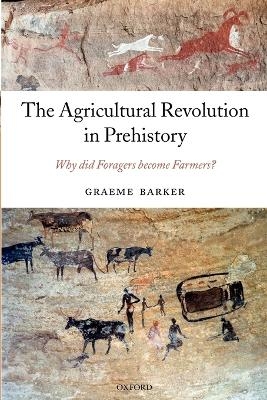
The Agricultural Revolution in Prehistory
Why did Foragers become Farmers?
Seiten
2009
Oxford University Press (Verlag)
978-0-19-955995-4 (ISBN)
Oxford University Press (Verlag)
978-0-19-955995-4 (ISBN)
This book addresses one of the most debated and least understood revolutions in the history of our species, the change from hunting and gathering to farming. Graeme Barker takes a global view, integrating an array of information from archaeology and other disciplines including anthropology, botany, climatology, genetics, linguistics, and zoology.
The Agricultural Revolution in Prehistory addresses one of the most debated and least understood revolutions in the history of our species, the change from hunting and gathering to farming. Graeme Barker takes a global view, and integrates a massive array of information from archaeology and many other disciplines, including anthropology, botany, climatology, genetics, linguistics, and zoology. Against current orthodoxy, Barker develops a strong case for the development of agricultural systems in many areas as transformations in the life-ways of the indigenous forager societies, and argues that these were as much changes in social norms and ideologies as in ways of obtaining food. With a large number of helpful line drawings and photographs as well as a comprehensive bibliography, this authoritative study will appeal to a wide general readership as well as to specialists in a variety of fields.
The Agricultural Revolution in Prehistory addresses one of the most debated and least understood revolutions in the history of our species, the change from hunting and gathering to farming. Graeme Barker takes a global view, and integrates a massive array of information from archaeology and many other disciplines, including anthropology, botany, climatology, genetics, linguistics, and zoology. Against current orthodoxy, Barker develops a strong case for the development of agricultural systems in many areas as transformations in the life-ways of the indigenous forager societies, and argues that these were as much changes in social norms and ideologies as in ways of obtaining food. With a large number of helpful line drawings and photographs as well as a comprehensive bibliography, this authoritative study will appeal to a wide general readership as well as to specialists in a variety of fields.
Graeme Barker is Disney Professor of Archaeology, and Director of the McDonald Institute for Archaeological Research, University of Cambridge.
1. Approaches to the origins of agriculture ; 2. Understanding foragers ; 3. Identifying foragers and farmers ; 4. The 'hearth of domestication'? Transitions to farming in South-West Asia ; 5. Central and South Asia: the wheat/rice frontier ; 6. Rice and forest farming in East and South-East Asia ; 7. Weed, tuber, and maize farming in the Americas ; 8. Africa: Afro-Asiatic pastoralists and Bantu farmers? ; 9. Transitions to farming in Europe: ex oriente lux? ; 10. The agricultural revolution in prehistory: why did foragers become farmers?
| Erscheint lt. Verlag | 22.1.2009 |
|---|---|
| Zusatzinfo | 138 in-text illustrations |
| Verlagsort | Oxford |
| Sprache | englisch |
| Maße | 157 x 234 mm |
| Gewicht | 916 g |
| Themenwelt | Geisteswissenschaften ► Archäologie |
| Geschichte ► Allgemeine Geschichte ► Vor- und Frühgeschichte | |
| Naturwissenschaften ► Geowissenschaften ► Geografie / Kartografie | |
| Weitere Fachgebiete ► Land- / Forstwirtschaft / Fischerei | |
| ISBN-10 | 0-19-955995-3 / 0199559953 |
| ISBN-13 | 978-0-19-955995-4 / 9780199559954 |
| Zustand | Neuware |
| Haben Sie eine Frage zum Produkt? |
Mehr entdecken
aus dem Bereich
aus dem Bereich
auf den Spuren der frühen Zivilisationen
Buch | Hardcover (2023)
C.H.Beck (Verlag)
20,00 €
Konzepte – Methoden – Theorien
Buch | Softcover (2024)
UTB (Verlag)
39,90 €
Was Pompeji über uns erzählt
Buch | Hardcover (2023)
Propyläen (Verlag)
32,00 €


